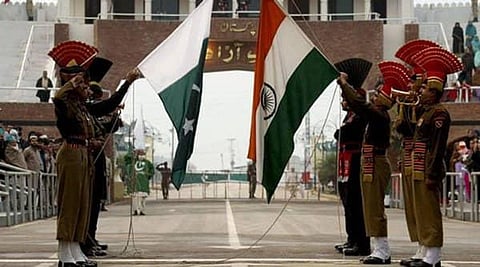
- Home
- NewsGram USA
- India
- न्यूजग्राम
- World
- Politics
- Entertainment
- Culture
- Lifestyle
- Economy
- Sports
- Sp. Coverage
- Misc.
- NewsGram Exclusive
- Jobs / Internships

By Gaurav Sharma
Ever since the rise of extremism in Punjab in the 1980s, which further expanded to the Kashmir Valley in the late 1990s, India and Pakistan have been engaged in a war of words, matching blow for blow for diplomatic one-upmanship.
In those days, it was common for the Indian officials to blame the Inter Service Intelligence (ISI), Pakistan's spy agency, for implanting the seed of insurgency in the Indian soil. Since then, many, if not all, of the terrorist activities committed against Indian citizens have been attributed to ISI, either directly or through indirect links.
Recently, the pendulum has swung, with Pakistan bearing the brunt of the treacherous seed which it nourished under the wings of the army and the ISI. In the midst of the chronic epidemic which is rapidly engulfing Pakistan by the day, not showing the slightest sign of abating, the Pakistani bureaucracy has turned the diplomatic warfare on its head.
The Pakistani military establishment has retaliated, by making a rather questionable assertion that the Research and Analysis Wings (RAW) are involved in staging terrorism activities in Pakistan.
As per an ISI public relations statement, the Chief of Army Staff General Raheel Sharif had chaired a conference on May 5 in which he had taken a "serious note of RAW's involvement in whipping up terrorism in Pakistan".
Although there is no hard evidence for making outrageous claims that India fuels terrorism activities in Pakistan, the country's diplomatic circle has been hell bent on frequently dragging India into international forums over issues such issues as water treaties, downing airplanes and other ill-informed matters.
When Sartaj Aziz, the advisor to the Pakistan Prime Minister on Foreign Affairs, made the pronouncement that Pakistan's acquisition of nuclear weapons "smashed India's dream", it highlighted the helpless state in which Pakistan finds itself.
On the face of it, such a statement is factually incorrect, because it is recorded in the pages of history that Pakistan's nuclear development programme was essentially an insecure response towards India's development of nuclear weapons.
During the 1965 Indo-Pakistan war, which comprised of a series of skirmishes in the Kashmir Valley, including the largest tank battle since World War 2, India had gained an upper hand after the ceasefire was declared.
Most Pakistanis, schooled in the belief of their own martial prowess, refused to accept the possibility of their country's military defeat by "Hindu India" and were, instead, quick to blame their failure to attain their military aims on what they considered to be the ineptitude of Ayub Khan and his government.
"The invading Indian forces outfought their Pakistani counterparts and halted their attack on the outskirts of Lahore, Pakistan's second-largest city. By the time United Nations intervened on September 22, Pakistan had suffered a clear defeat," wrote David T. Hagerty in his book South Asia in World Politics.
Through the Shimla Agreement, Pakistan was forced to recognize the independence of East Pakistan or Bangladesh as it is now known. The war had wiped-out half of the Pakistani navy, a quarter of its air force and a third of its army.
But more than that, the war was a psychological setback for Pakistan, a humiliating and complete defeat at the hands of its rival. So massive was the magnitude of the aftermath that the then President General Yahya Khan surrendered power to Zulfiqar Ali Bhutto.
After India conducted the Smiling Buddha, a surprise nuclear test in 1974, which was also the first confirmed nuclear test by any nation outside the United Nations Security Council, Pakistan started moving towards the goal of nuclear weapons with greater and desperate urgency.
To conclude, Pakistan's inability to curb the bloody flow of terrorism has splintered the country into a chaotic schism and, as a result, forced Pakistan to make baseless and uninformed allegations against India.
Rather than shackling itself with the chains of such a warped imagination, it would do well for Pakistan to introspect its strategic geopolitical decisions and address the problem where its roots really lie, its own backyard.
